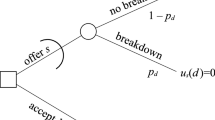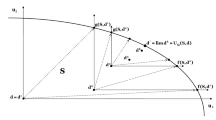Abstract
Under fallback bargaining, bargainers begin by indicating their preference rankings over alternatives. They then fall back, in lockstep, to less and less preferred alternatives – starting with first choices, then adding second choices, and so on – until an alternative is found on which all bargainers agree. This common agreement, which becomes the outcome of the procedure, may be different if a decision rule other than unanimity is used. The outcome is always Pareto-optimal but need not be unique; if unanimity is used, it is at least middling in everybody's ranking. Fallback bargaining may not select a Condorcet alternative, or even the first choice of a majority of bargainers. However, it does maximize bargainers' minimum “satisfaction.” When bargainers are allowed to indicate “impasse” in their rankings – below which they would not descend because they prefer no agreement to any lower-level alternative – then impasse itself may become the outcome, foreclosing any agreement. The vulnerability of fallback bargaining to manipulation is analyzed in terms of both best responses and Nash equilibria. Although a bargainer can sometimes achieve a preferred outcome through an untruthful announcement, the risk of a mutually worst outcome in a Chicken-type game may well deter the bargainers from attempting to be exploitative, especially when information is incomplete. Fallback bargaining seems useful as a practicable procedure if a set of “reasonable” alternatives can be generated. It leapfrogs the give-and-take of conventional bargaining, which often bogs down in details, by finding a suitable settlement through the simultaneous consideration of all alternatives.
Similar content being viewed by others
References
Arrow, Kenneth J. (1963). Social Choice and Individual Values, 2nd ed. New Haven, CT: Yale University Press.
Bogart, Kenneth P. (1990). Introductory Combinatorics, 2nd ed. San Diego, CA: Harcourt Brace Jovanovich.
Brams, Steven J. (1990). Negotiation Games: Applying Game Theory to Bargaining and Arbitration. New York: Routledge.
Brams, Steven J. (1994). Theory of Moves. Cambridge, UK: Cambridge University Press.
Brams, Steven J., and Ann E. Doherty. (1993). “Intransigence in Negotiations: The Dynamics of Disagreement, ” Journal of Conflict Resolution 7, no. 4 (December), 692–708.
Brams, Steven J., and Peter C. Fishburn. (1983). Approval Voting. Boston, MA: Birkhäuser/Springer-Verlag.
Brams, Steven J., and Alan D. Taylor. (1996). Fair Division: From Cake-Cutting to Dispute Resolution. Cambridge, UK: Cambridge University Press.
Brams, Steven J. (1999). The Win-Win Solution: Guaranteeing Fair Shares to Everybody. New York: W.W. Norton.
Eban, Abba. (1998). Diplomacy for the Next Century. New Haven, CT: Yale University Press.
Gibbard, Alan. (1973). “Manipulation of Voting Schemes: A General Result, ” Econometrica 41 (May), 587–601.
Hurwicz, Leonid. (1996). “Institutions as Families of Game Forms, ” Japan Economic Review 27, no. 2, 113–132.
Hurwicz, Leonid, and Murat R. Sertel. (1997). “Designing Mechanisms, in Particular for Electoral Systems: The Majoritarian Compromise, ” Preprint, Department of Economics, Bogazici University, Istanbul, Turkey.
Maskin, Eric S. (1985). “The Theory of Implementation in Nash Equilibrium: A Survey”, in Leonid Hurwicz, David Schmeidler, and Hugo Sonnenschein (eds.), Social Goals and Social Organization: Essays in Memory of Elisha Pazner. Cambridge, UK: Cambridge University Press, pp. 173–204.
Moulin, Hervé. (1983). The Strategy of Social Choice. Amsterdam: North-Holland.
Mueller, Dennis C. (1989). Public Choice II. Cambridge, UK: Cambridge University Press.
Nash, John. (1950). “The Bargaining Problem, ” Econometrica 18, no. 2 (January), 155–162.
Potthoff, Richard F., and Steven J. Brams. (1998). “Proportional Representation: Broadening the Options, ” Journal of Theoretical Politics 10, no. 2 (April), 147–178.
Sadovskii, L. E., and A. L. Sadovskii. (1993). Mathematics and Sports, trans. from the Russian by S. Makar-Limanov. Providence, RI: American Mathematical Society.
Satterthwaite, Mark Allen. (1975). “Strategy Proofness and Arrow's Conditions: Existence and Correspondence Theorems for Voting Procedures and Social Welfare Functions, ” Journal of Economic Theory 10 (April), 197–218.
Sertel, Murat R., and M. Remzi Sanver. (1997). “Designing Public Choice Mechanisms: Alternative Electoral Systems for Turkey, ” Preprint, Department of Economics, Bogazici University, Istanbul, Turkey.
Sertel, Murat R., and Bilge Yilmaz. (1999). “The Majoritarian Compromise Is Majoritarian-Optimal and Subgame-Perfect Implementable, ” Social Choice and Welfare 16, no. 4 (August), 615–627.
Shakun, Melvin F. (1988). Evolutionary Systems Design: Policy Making under Complexity and Group Decision Support. San Francisco, CA: Holden-Day.
Author information
Authors and Affiliations
Rights and permissions
About this article
Cite this article
Brams, S.J., Kilgour, D.M. Fallback Bargaining. Group Decision and Negotiation 10, 287–316 (2001). https://doi.org/10.1023/A:1011252808608
Issue Date:
DOI: https://doi.org/10.1023/A:1011252808608




